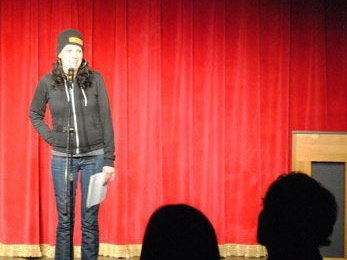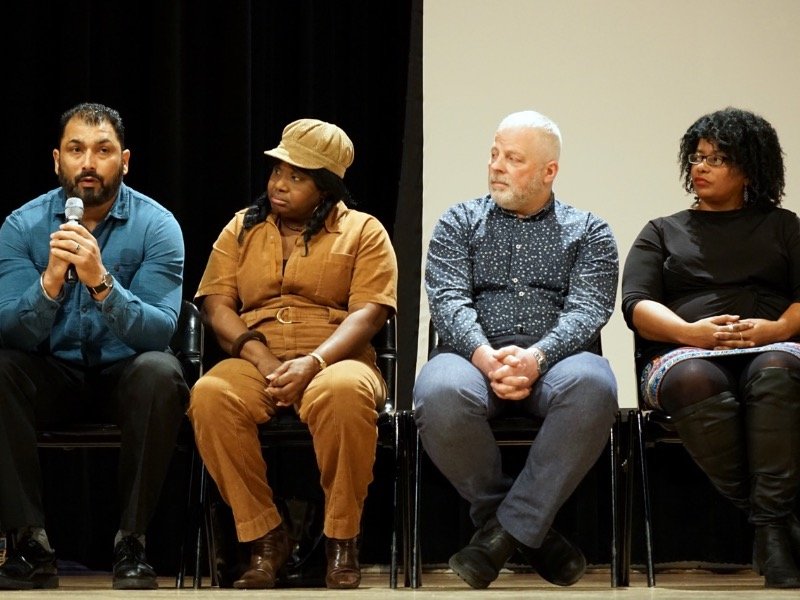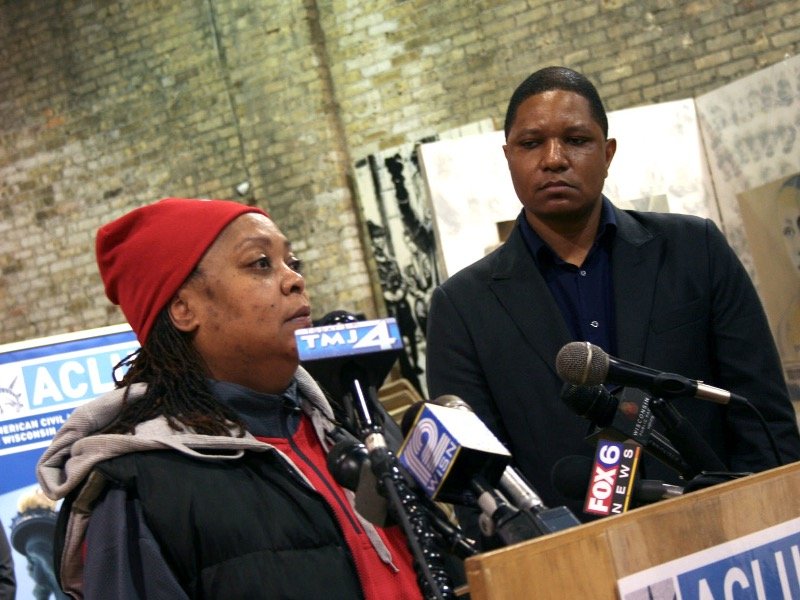Last Thursday, I had the honor of reading in a performance showcase called Verbatim. Milwaukee club owner, novelist and spoken word artist Dasha Kelly organized the event. It took place in the Milwaukee Repertory Theater’s intimate Stackner Cabaret and was really successful on many levels.
I was intrigued with the invitation because, these days, I rarely share my writing outside of my OnMilwaukee.com articles and blogs. And there’s a lot of it. I keep a personal blog and write a lot of poetry, letters and creative non-fiction.
It was interesting -- and a little unnerving -- to share my "private" writings. In the end, I really enjoyed the experience and I received very sincere, positive feedback. Hence (God, I love the word "hence"), I thought I would take it a step further and share the piece I read for Verbatim here, too. Have at it.
Humans are often meaner than animated cows
In 2002, I adopted a baby boy from Guatemala City, Guatemala.
Unfortunately, the reality of international adoption boils down to money and whether or not one can cough it up. It cost $28,000 to adopt my son -- almost all of the money went to lawyers -- and the only reason I could afford this was because I accidentally made a couple of lucrative real estate investments in the late '90s.
I start off by saying this because I want to share what it is like to be a white mother with a brown son, but I want to make it clear that by no means am I suggesting it is a hardship. It is, indeed, a privilege.
And yet, my experiences -- I am not sure what else I might also call them -- are undeniable. They are perplexing, infuriating, heartwarming, comical. And so I write about them; here are six vignettes:
Uno.
We are at a family reunion in a small town in northern Wisconsin. I am straddling on my hip my 13-month-old-son and have my newborn son strapped to my front. I am standing in the garage, drinking a beer (no judgments, por favor) and a distant family member saunters over to me.
"You got quite the surprise there," he says, nodding towards my newborn son and referring to my unexpected pregnancy half-way through the adoption of my older son.
"Yeah," I say. "It was."
"A miracle," he adds. I shrug.
"So, you couldn’t just return that one?" he asks, nodding towards my older son. "You know, when you found out you were having your own?"
This is wrong on so many levels. My first response is to kick him in the knees.
But after my anger subsided, I wanted to tell him what it felt like when the adoption agency sent me an e-mail with a photo attachment of my 5-hour-old son and the brief statement, "Please consider this healthy baby boy." I wanted to tell him that, from the moment I saw the photo, I knew this was my son.
I wanted to tell him that I traveled to Guatemala twice to visit my infant son and that coming home on the plane without him was the most heartbreaking experience of my life.
I wanted to tell him how much I missed my son during the adoption process, after I knew him and had cared for him and yet couldn’t bring him into the country because of stupid red tape. I wanted to tell him about the shopping trips to buy tiny socks because when I pined for him, somehow shopping for inexpensive tiny items made me feel better.
But I didn’t say any of this. Instead, I kissed my son’s crazy mop of black curls and walked away.
Later I would learn that a lot of people make statements like this and they don’t usually mean anything negative by it. They’ll say, "Do you know who his real mother is?" And I say, "I’m his real mother. I believe you mean 'birth mother' and yes, I do."
Most of the comments are accidental and simply provide an opportunity for me to educate friends on inoffensive adoption terminology. But the distant relative at the family reunion crossed a line that made my skin burn.
I wish I had told him that my son wasn’t a V-neck sweater from J Crew. He didn’t come with a return address. And I wish I would have kicked him in the knees.
Dos.
I am at a party, and a woman runs over to me with a big smile on her face.
"I heard you adopted a baby from Guatemala!" she exclaims.
"I did," I say, wondering who this woman is and why she is beaming at me like I just told her I paid off her mortgage.
"I’m Kelly, Amy’s friend," she says.
"Oh, hi," I say. "Yes, I adopted my son from Guatemala a couple of years ago."
"Wow! How much was he?" she asks, still beaming.
Really? Your first question about my son revolves around money?
Unfortunately, this conversation has happened many times and in many forms. I am open about the cost of international adoption, because I do find it to be insanely expensive and unfair that so many people who would love to adopt a baby are unable to because of lack of funds, but like so many aspects to adoption talk, it depends on the delivery.
In the case of smiling Kelly, because the first question out of her mouth is about money and she asked it like he was a toaster oven instead of a person, she’s done. If, instead, we had a conversation where multiple questions were asked, including cost, that would be different.
Whenever the "how much did he cost?" question arises, I see in my mind an online shopping cart with a "remove item from cart" button next to it. Adopting my son was not a financial decision. It was an investment with returns that include more metaphorical zeros and commas than I could ever imagine.
Tres.
"Where’s his daddy from?" a voice asks me from behind.
I was deciding between two boxes of vegetable broth when, out of nowhere, I hear this woman asking me a question, I assume, about my 3-year-old son who is sitting in the cart munching on Goldfish crackers.
I turn around and look at her. She is suspiciously looking at my son’s face, then mine, then back at my son. I know what she is really wondering: did I have sex with a black guy, a Latin guy or an Indian guy to get a baby who looks like that?
"His daddy’s from Green Bay," I say truthfully.
The fact is, when two white people have a black or brown baby, people wonder. This is normal and OK. But again, it’s how they handle their curiosity. Why do some think such personal information should be readily available to them?
Cuatro.
I push my son in a stroller around the neighborhood on a warm, spring day. A man is walking on the other side of the street. He keeps looking at us.
"You like black guys?" he asks, big smile on his face.
Did he really expect an answer? Did he really think I might stop, scratch my head and say, "Let’s see, I had a sweet and awkward African-American boyfriend during my senior year in high school. Oh, and of course, there was the boy at the college kegger with the great afro that I almost went home with."
No, this is not what he means.
Cinco.
Some friends are playing with my 4-year-old son. We are hanging out in the yard on a warm June Sunday and they are tossing a plastic ball to him in the backyard. Like most of our friends, they are smitten with my beautiful, long-haired little boy.
"Hey, little beaner, come here," says the male friend.
I suddenly hear the scratching sound of a needle dragging across a record.
"What did you just say?" I ask, certain I must have misunderstood.
"He's my lil' beaner," he says, tousling his hair.
I am stunned. I do not know what to say. I need a moment to assess, so I go to the bathroom and look in the mirror. I ask myself if there is really anything wrong with calling my Latin son "lil' beaner." Am I being too sensitive? Should I just let it go?
I can’t.
I go back outside. I say lightly, "Hey, you can't call him 'lil' beaner.’ That’s not right."
"Come on," he says. "Really? You gonna get PC on me? It’s just a nickname. I refer to Walker’s Point sometimes as 'Beantown' and I don't mean anything by it."
"You do?" I ask, abhorred. "You refer to Walker’s Point as 'Beantown?' Who are you?"
I am trying to keep it light, but I am suddenly really grossed out. Could we still be friends? Was this a deal breaker? I needed more time, but this felt like a deal breaker.
"You’re just gonna have to pick another nickname for him," I say firmly.
Seis.
It is Christmas day and we are sitting in a movie theater watching a kids' film that mostly takes place in a barn.
"Mama," my son says in a loud voice. "Those cows are like us. Some are pink and some are brown."
The movie experience was the first time he expressed that we were physically different.
Somehow, despite the inappropriate comments and constant images of mono-racial families over the years, my son discovered our racial difference in a natural, healthy way.
I know it is way more complicated, but I have suggested that skin color is the same as hair or eye color. I have told him that all families come together in unique ways and that love, not blood, makes a family.
He is 8 now, and soon we will talk about some of the experiences in this article. Soon he will know, if he doesn’t already, that humans are often meaner and more judgmental than animated cows.
Molly Snyder started writing and publishing her work at the age 10, when her community newspaper printed her poem, "The Unicorn.” Since then, she's expanded beyond the subject of mythical creatures and written in many different mediums but, nearest and dearest to her heart, thousands of articles for OnMilwaukee.
Molly is a regular contributor to FOX6 News and numerous radio stations as well as the co-host of "Dandelions: A Podcast For Women.” She's received five Milwaukee Press Club Awards, served as the Pfister Narrator and is the Wisconsin State Fair’s Celebrity Cream Puff Eating Champion of 2019.







